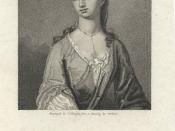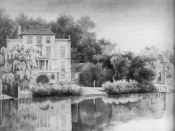Alexander Pope's The Rape of the Lock and Joseph Addison's The Spectator are both satires that gently criticize the lives of the wealthy classes in the early eighteenth century. The mock epic narrates the uproar that results when the Baron cuts Belinda's lock of hair. The diarist in The Spectator chronicles his banal daily routine. The mock epic critiques young aristocrats while Addison mocks the life of a wealthy diarist.
Pope's mock epic creates Belinda and the Baron, the main characters, as epic heroes even though they are young and lounge around drinking tea all day. As Belinda is groomed for the day, an image of her dresser is created with "Puffs, Patches, Bibles, Billet Doux" (1.138). Thus, her make-up and accessories are of the same importance has her spirituality and beliefs. On one lazy day, the two characters and friends decide to play a card game named Ombre "singly to decide their Doom" (3.27),
which creates a very sarcastic tone. A mock battle commences with "four Kings, in Magesty rever'd / With hoary Whiskers and a forky Beard; / And four fair Queens whose hands sustain a Flow'r" (3.37-39). Consequently, the young aristocrats are mocked because they consider the senseless card game extremely important. Also, a mock battle occurs after the Baron cuts a lock of Belinda's hair. Consequently, a "[...] mighty Contest [rises] from trivial Things" (1.2).
The diary, much like Pope's mock epic, creates a character who keeps a journal of all his normal, mundane activities. The diarist never gives emphasis to one activity more than another. He briefly mentions the Grand Vizier being "certainly dead" (88) and makes only that comment, while repeatedly noting he "washed [his] hands" (4). Thus, he places important political issues on the same importance level as his hygiene. He places...


